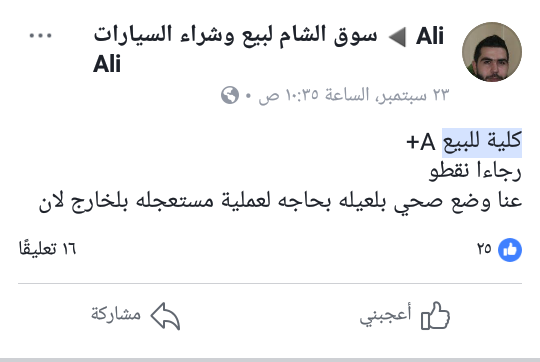Kidneys for Sale in Northern Syria

"One recent advert posted online was from a 32 year-old Syrian man called Amer, who said that he was willing to sell a kidney as he had no other way to feed his wife and two children."
Adverts offering human kidneys for sale have begun to appear among online listings for mobile phones and second-hand cars on social media pages in northern Syria.
Some Syrians say that the trend reflects the increasingly desperate situation in rebel-held areas, even though there is no evidence that any of these proposed transactions have been followed through.
One recent advert posted online was from a 32 year-old Syrian man called Amer, who said that he was willing to sell a kidney as he had no other way to feed his wife and two children.
Another was from Ali, a 32 year-old man displaced from Damascus, who said that he had been desperate to try and fund his mother’s medical treatment.
“After struggling for many years to treat my mother’s skin cancer, we had no choice but to sell our house in Damascus,” he said. “We had debts exceeding two million Syrian pounds which had to be paid back to friends and relatives. The doctor advised us to travel to a European country where treatment is offered for free instead of repeatedly having to pay hefty hospital bills. However, I couldn’t find a way to earn enough money to pay for these travel expenses apart from posting an ad to sell one of my kidneys for 1,000 US dollars.”
In the end Ali did not have to resort to such drastic measures. But observers say that his plight highlights the terrible humanitarian situation.
“These offers and the situation in which people are living in northern Syria reveal a real disaster,” said Abou Thaer, 24. “If they had something [of any value] to sell, they wouldn’t resort to selling a kidney or any other body part. The appalling state in which these people are in now is the responsibility of humanitarian and relief organisations working in Idlib and its Rif, and of the local councils, which are supposed to be accountable for the inhabitants’ living conditions. I believe that helping those people improve their living conditions should be a priority, instead of holding events and activities costing thousands and thousands of dollars.”
Ward, a 25-year-old originally from Zabadani in Rif Dimashq now living in Austria, also advertised a kidney online around a year ago.
“What really drove me to put up my kidney for sale was my feeling of helplessness towards the children of Zabadani and Madaya, besieged for years by the Syrian regime, and my compassion for these innocents. I wasn’t able to send them any aid, and I could not earn money as I had not yet been granted residence in Austria. The only way I could find to raise money and help my besieged village was to sell my kidney,” he said.
Ward’s post on an e-market site was greeted with praise from supporters and the offer of a few modest contributions. In the end, he did not sell his kidney, instead managing to raise an equivalent amount from private donations.
However, not everyone is in sympathy with those who post such adverts. Idlib resident Abou Yaakoub, 35, said that offers to sell organs were a scam and a way of exhorting money from gullible people.
“I don’t think any circumstances are bad enough to drive people to sell their organs. Only rarely do people not have a house or piece of land to sell…they would usually rather find a job, even if poorly paid, or sell their land or house, or start their own enterprises as many have done before them. I believe this phenomenon is a new way of abusing sympathisers’ feelings through a sort of emotional blackmail,” he concluded.
Sheikh Abdel Razzak, an imam from a mosque in Rif Idlib, said that although organ donation was allowed in Islam, selling a part of one’s body for profit was forbidden.
“The human body was built by God, and he exempted it from sale and purchase; he strictly forbade any form of trading with it,” he said. “Therefore, human organs cannot be subject to sale or purchase. They are not commodities to be exchanged or traded… any money acquired through the sale of a body part is illegitimate.”
Despite the swathe of adverts offering kidneys for sale, the chances of actually carrying out such an operation are near impossible in northern Syria.
Abou Qotada Al-Hakim, a surgeon in Rif Aleppo, said that he had never even encountered such a request.
“We have not been faced with such a situation in hospitals under the control of Syrian opposition, either in Rif Dimashq or in Rif Aleppo,” he said. “We have never been offered the chance to buy or sell a human organ, and if this ever occurred, we would never conduct such an operation in our hospitals, even if the organ was donated.”
Explaining that hospitals in the region lacked the facilities for such delicate procedures, he said, “Extraction and implantation operations require a special conditions which we lack, in addition to lacking the equipment for such operations and the facilities to conduct tissue compatibility tests,” he said.
That still left the possibility that some people travelled abroad for the procedure, he continued, adding, “It’s possible that sales and purchases are conducted over the internet within our territories, and the parties involved may agree to travel to Turkey or a European country to conduct such operations.”
